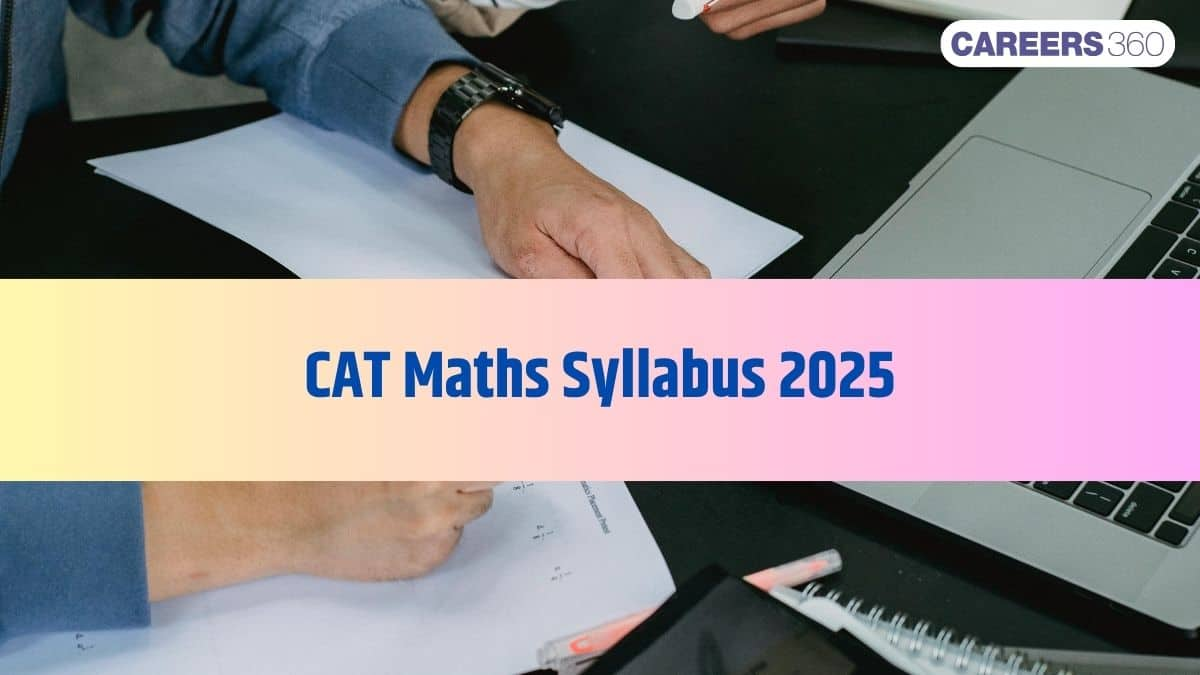Great Lakes - PGDM & PGPM Admissions 2026
Application Deadline: 10th March | Globally Recognized by AACSB (US) & AMBA (UK) | 17.8 LPA Avg. CTC for PGPM 2025
The CAT Maths syllabus includes the mathematical topics to be asked for in the Quantitative Aptitude section of the CAT exam. The CAT math syllabus covers various topics and concepts that test the candidates' mathematical skills and number-crunching Aptitude. CAT math syllabus covers topics like logarithms, work and time, percentage, probability, profit and loss, ratios and proportions and others. The CAT Maths syllabus discussed here is prepared based on the previous year's CAT question paper pattern. The CAT exam body gives no pre-defined specific CAT maths syllabus. The CAT math syllabus is based on general and advanced mathematics concepts. Strong command and rigorous practice of the important concepts are necessary to score well in the Quantitative Aptitude section.

The weightage of maths in CAT through the Quantitative Aptitude section is significant. The Quantitative Aptitude section contains 22 out of the 66 questions holding a total of 66 marks out of 198. The CAT-accepting institutes such as IIMs have specified sectional cutoffs required for eligibility purposes. The detailed weightage of the maths in the CAT syllabus is given in the table below.
CAT Exam Section | Quantitative Aptitude |
Total Math Questions | 22 |
Total Marks | 66 |
Marking Scheme |
|
The CAT math syllabus is not defined. It has a wide array of topics that a candidate must study to excel in this section of the CAT exam. Concepts from arithmetics, trigonometry, and geometry are a few to state the important ones. The important topics that a candidate should keep on their checklist while preparing for the CAT Quantitative Aptitude section are mentioned in the table below.
CAT Exam Section | CAT Math Syllabus Important Topics |
Quantitative Aptitude |
|
The CAT math syllabus can be broadly divided into four areas given below.
Application Deadline: 10th March | Globally Recognized by AACSB (US) & AMBA (UK) | 17.8 LPA Avg. CTC for PGPM 2025
Ranked among top 10 B-Schools in India by multiple publications | Top Recruiters-Google, MicKinsey, Amazon, BCG & many more.
Also See:
All these four areas of mathematics have their weightage in the quant section of the CAT exam. The weightage of these areas according to past CAT papers and candidate feedback has been mentioned in the table below.
Areas of CAT Maths Syllabus | Weightage |
Arithmetic | 45.5% |
Geometry | 13.6% |
Modern Maths | 18.2% |
Algebra | 22.7% |
Frequently Asked Questions (FAQs)
Overall, CAT maths has a moderate difficult level, but sometimes it turns easy for candidates who start their preparation early and practice all three sections.
Most of the mathematical concepts used to formulate questions in the quant section of the CAT exam are the ones taught in the 10th, 11th, and 12th standard mathematics. The level of the questions however remains a bit inclined towards the advanced level.
Qualifying CAT and sectional cutoffs are required for IIM so it makes maths essential for IIM. Having your way with numbers and mathematical ability surely adds up to the overall profile of a candidate applying for IIM.
The use of a calculator is strictly prohibited in the CAT exam. Candidates found with any restricted electronic item during the CAT exam will get their candidature terminated immediately. They might also be banned from appearing for future CAT exams.
The syllabus of maths in CAT comprises four different parts namely, arithmetic, geometry, modern maths, and algebra. Out of the four, the arithmetic part accounts for most of the questions followed by algebra, modern maths, and geometry.
On Question asked by student community
Hello
If you are looking to take admission in the MBA programme with a CAT score of 73, check out the list of MBA Colleges accepting 70-80 percentile .
All the best!
You can find all the information here:
CAT- https://bschool.careers360.com/articles/cat-exam-dates
SNAP- https://bschool.careers360.com/articles/snap-exam-dates
Hi Minakshi,
You can find the details related to IIM Kashipur admission criteria by clicking on the link below:
Dear Saloni,
May i know which college you are looking to apply for? Because the MBA fee varies from one college to another. Please check MBA fees colleges wise here:
MBA Fees in India 2025: Top Colleges, Fee Structure, Courses, Cost of MBA
Admission to IIFT (Indian Institute of Foreign Trade) for its flagship MBA (International Business) is generally through the CAT exam (as per the latest admission process), and there is no regular direct admission without an entrance test. However, executive or certificate courses may have different criteria. With Bcom (Foreign Trade)
Ranked among top 10 B-Schools in India by multiple publications | Top Recruiters-Google, MicKinsey, Amazon, BCG & many more.
Application Deadline: 10th March | Globally Recognized by AACSB (US) & AMBA (UK) | 17.8 LPA Avg. CTC for PGPM 2025
Industry Internship Training
NAAC A++ Accredited | Ranked #12 by NIRF
Last Date to Apply: 26th March | Ranked #36 amongst institutions in Management by NIRF | 100% Placement
MBA Admissions Open 2026 | UGC Approved Programs | Near 100% Placement Record | Up to 100% Scholarships | Highest CTC 21.32 LPA